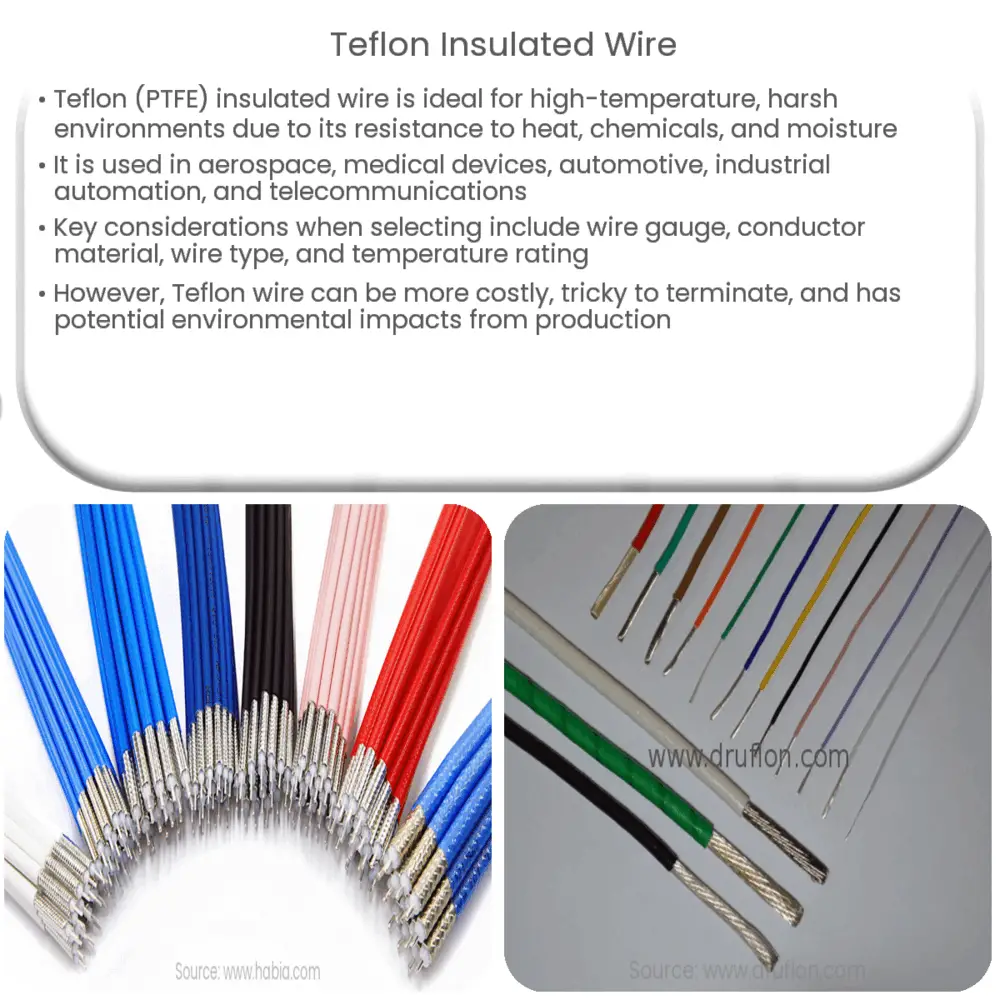Teflon insulated wire is ideal for high-temperature, harsh environments due to its resistance to heat, chemicals, and moisture, making it suitable for various industries.

Teflon Insulated Wire: The Choice for High-Temperature and Harsh Environments
Introduction
Teflon insulated wire, also known as PTFE (polytetrafluoroethylene) wire, has gained popularity due to its unique properties that make it suitable for use in high-temperature, harsh, and demanding environments. This insulation material is known for its ability to resist heat, chemicals, and moisture, making it a top choice for numerous industrial applications. In this article, we will discuss the advantages of Teflon insulated wire, its typical applications, and considerations when selecting this type of wire.
Benefits of Teflon Insulated Wire
Teflon insulated wire offers a range of advantages over other insulation materials, such as PVC or silicone rubber. Some of its key benefits include:
- High Temperature Resistance: Teflon insulated wire can withstand temperatures ranging from -90°C to +260°C, making it suitable for applications that involve extreme temperature fluctuations.
- Chemical Resistance: PTFE is highly resistant to most chemicals, including solvents, acids, and bases. This makes it ideal for use in harsh environments where exposure to corrosive substances is common.
- Moisture Resistance: The hydrophobic nature of Teflon prevents moisture absorption and makes it an excellent choice for applications that require water or humidity resistance.
- Low Dielectric Constant: Teflon has a low dielectric constant, which means that it has low electrical conductivity. This property allows for minimal signal loss and reduced interference in signal transmission applications.
- Mechanical Stability: PTFE wires exhibit excellent mechanical stability and are resistant to abrasion, making them well-suited for applications with frequent movement or vibration.
Typical Applications of Teflon Insulated Wire
Due to its unique properties, Teflon insulated wire is commonly used in various industries and applications, such as:
- Aerospace and Defense: The high-temperature and chemical resistance of Teflon wires make them ideal for use in aerospace and defense applications, including aircraft wiring, missile systems, and military communication equipment.
- Medical Devices: The biocompatibility and resistance to sterilization processes of PTFE make it suitable for medical device wiring, such as surgical instruments, catheters, and patient monitoring systems.
- Automotive: Teflon insulated wires are used in high-performance vehicles and engine compartments, where high-temperature resistance is crucial for reliable operation.
- Industrial Automation: The durability and chemical resistance of Teflon wires make them a popular choice for wiring in industrial automation systems, particularly in chemical plants, oil and gas refineries, and power generation facilities.
- Telecommunications: Due to its low dielectric constant, Teflon insulated wire is used in high-frequency signal transmission applications, such as coaxial cables and microwave transmission lines.
Considerations When Selecting Teflon Insulated Wire
While Teflon insulated wire offers numerous advantages, it is essential to consider certain factors when selecting the right wire for your application:
- Wire Gauge: Choose the appropriate wire gauge based on your specific application’s current-carrying capacity and voltage requirements. A thicker wire can handle higher current loads, but it may be less flexible and more challenging to work with.
- Conductor Material: Teflon insulated wires can use various conductor materials, such as copper, silver-plated copper, or nickel-plated copper. The choice of conductor material will depend on factors like cost, conductivity, and the operating environment.
- Wire Type: Depending on your application, you may require single-conductor or multi-conductor Teflon insulated wire. Multi-conductor wires can simplify wiring in applications with multiple circuits or connections.
- Temperature Rating: Ensure that the temperature rating of the Teflon insulated wire matches the temperature range of your application to prevent potential damage or malfunction.
- Standards and Certifications: Check if the Teflon insulated wire meets the required industry standards or certifications for your specific application, such as UL, CSA, or MIL-spec.
Challenges and Limitations of Teflon Insulated Wire
While Teflon insulated wire offers many benefits, it also has some limitations and challenges:
- Cost: Teflon insulated wire is generally more expensive than other types of insulated wire due to its unique properties and manufacturing process. It may not be cost-effective for applications where the advantages of Teflon are not required.
- Termination: Teflon insulation can be challenging to strip and terminate due to its toughness and resistance to heat. Specialized tools and techniques may be necessary for successful termination and connection.
- Environmental Impact: The production of Teflon can generate harmful byproducts, such as perfluorooctanoic acid (PFOA), which has raised concerns about its environmental impact. Some manufacturers have adopted alternative PTFE production methods to reduce the release of such substances.
Conclusion
Teflon insulated wire is a versatile and robust solution for applications in high-temperature, harsh, and demanding environments. Its unique properties, such as temperature, chemical, and moisture resistance, make it an ideal choice for industries like aerospace, medical, automotive, industrial automation, and telecommunications. When selecting Teflon insulated wire, consider factors such as wire gauge, conductor material, wire type, temperature rating, and standards compliance. However, be aware of the challenges and limitations associated with Teflon insulated wire, such as cost, termination difficulties, and environmental concerns.

